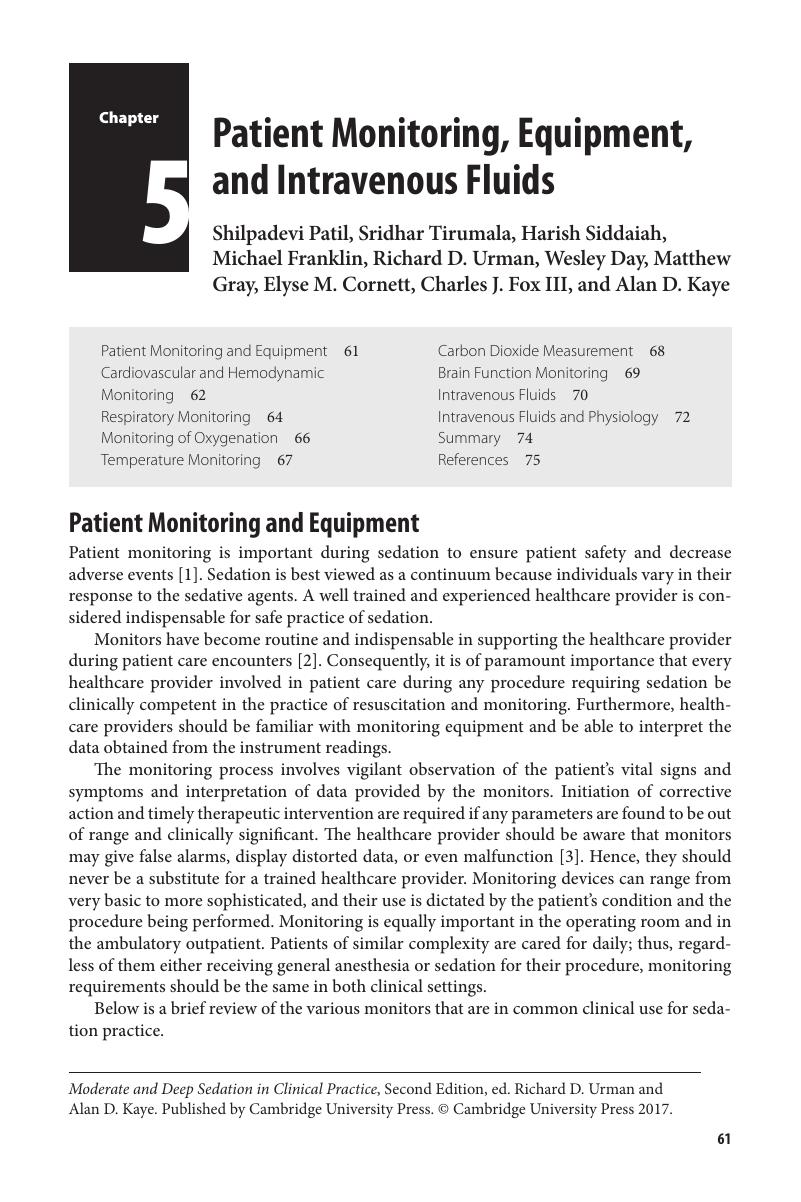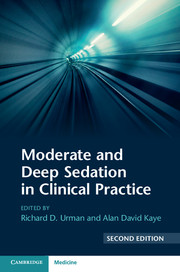Book contents
- Moderate and Deep Sedation in Clinical Practice
- Moderate and Deep Sedation in Clinical Practice
- Copyright page
- Dedication
- Contents
- Contributors
- Foreword
- Preface
- Guidelines and Standards
- 1 Introduction to Moderate and Deep Sedation
- 2 Pharmacology Principles in Sedation
- 3 Pain Assessment and Management Considerations
- 4 Patient Evaluation and Procedure Selection
- 5 Patient Monitoring, Equipment, and Intravenous Fluids
- 6 Credentialing, Competency, and Education
- 7 Quality, Legal, and Risk Management Considerations: Ensuring Program Excellence
- 8 Nursing Considerations for Sedation
- 9 Physician Assistants and Nurse Practitioners
- 10 High-risk Patients: Sedation Considerations in Coexisting Disease
- 11 Respiratory Compromise in Moderate and Deep Sedation
- 12 Management of Complications of Moderate and Deep Sedation
- 13 Recovery and Discharge after Procedural Sedation
- 14 Outcomes, Controversies, and Future Trends
- 15 Simulation Training for Sedation
- 16 Sedation in the Radiology Suite
- 17 Sedation in the Endoscopy Suite
- 18 Sedation in the Interventional Cardiology Suite
- 19 Sedation in the Emergency Department
- 20 Sedation in the Intensive Care Setting
- 21 Pediatric Sedation: Practical Considerations
- 22 Pediatric Sedation: Safety and Outcomes
- 23 Sedation in the Office and Other Outpatient Settings
- 24 Sedation in Dentistry
- 25 Sedation for Assisted Reproductive Technologies
- 26 Interventional Pain Management Procedures
- 27 Emergency Resuscitation Algorithms: Adults
- 28 Emergency Resuscitation Algorithms: Infants and Children
- Index
- References
5 - Patient Monitoring, Equipment, and Intravenous Fluids
Published online by Cambridge University Press: 22 November 2017
- Moderate and Deep Sedation in Clinical Practice
- Moderate and Deep Sedation in Clinical Practice
- Copyright page
- Dedication
- Contents
- Contributors
- Foreword
- Preface
- Guidelines and Standards
- 1 Introduction to Moderate and Deep Sedation
- 2 Pharmacology Principles in Sedation
- 3 Pain Assessment and Management Considerations
- 4 Patient Evaluation and Procedure Selection
- 5 Patient Monitoring, Equipment, and Intravenous Fluids
- 6 Credentialing, Competency, and Education
- 7 Quality, Legal, and Risk Management Considerations: Ensuring Program Excellence
- 8 Nursing Considerations for Sedation
- 9 Physician Assistants and Nurse Practitioners
- 10 High-risk Patients: Sedation Considerations in Coexisting Disease
- 11 Respiratory Compromise in Moderate and Deep Sedation
- 12 Management of Complications of Moderate and Deep Sedation
- 13 Recovery and Discharge after Procedural Sedation
- 14 Outcomes, Controversies, and Future Trends
- 15 Simulation Training for Sedation
- 16 Sedation in the Radiology Suite
- 17 Sedation in the Endoscopy Suite
- 18 Sedation in the Interventional Cardiology Suite
- 19 Sedation in the Emergency Department
- 20 Sedation in the Intensive Care Setting
- 21 Pediatric Sedation: Practical Considerations
- 22 Pediatric Sedation: Safety and Outcomes
- 23 Sedation in the Office and Other Outpatient Settings
- 24 Sedation in Dentistry
- 25 Sedation for Assisted Reproductive Technologies
- 26 Interventional Pain Management Procedures
- 27 Emergency Resuscitation Algorithms: Adults
- 28 Emergency Resuscitation Algorithms: Infants and Children
- Index
- References
Summary

- Type
- Chapter
- Information
- Moderate and Deep Sedation in Clinical Practice , pp. 61 - 76Publisher: Cambridge University PressPrint publication year: 2017

